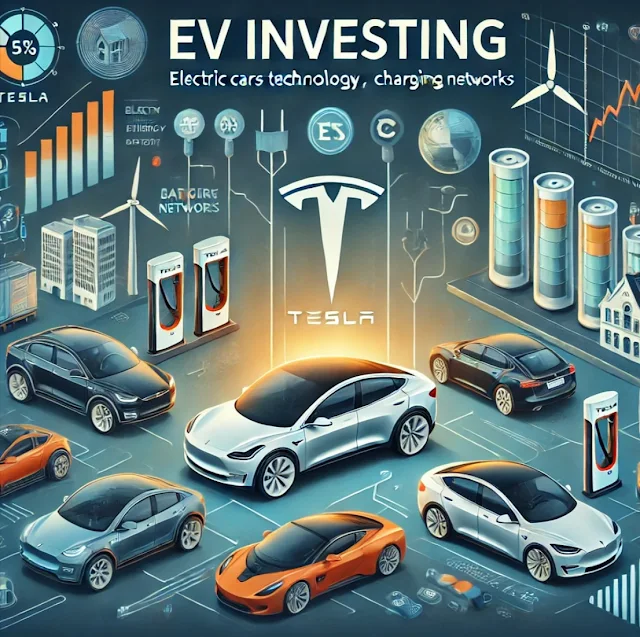Introduction
The electric vehicle (EV) industry is undergoing rapid expansion, driven by government policies, consumer demand, and advancements in battery technology. While Tesla (TSLA) remains a dominant player, there are numerous other companies leading innovation in EV production, battery technology, and charging infrastructure.
Investors looking for high-growth opportunities in the EV market should explore alternative companies that are shaping the future of transportation.
What You’ll Learn in This Guide:
✅ Why the EV market is a long-term investment opportunity
✅ Best EV stocks beyond Tesla in 2024
✅ Battery and charging infrastructure companies leading innovation
✅ Risks and challenges of investing in EV stocks
✅ Investment strategies for long-term EV growth
1. Why Invest in the Electric Vehicle Industry?
A. Global Shift Toward EV Adoption
✔ Governments worldwide are mandating zero-emission vehicle targets by 2035.
✔ Consumer demand for clean transportation is increasing due to climate concerns.
💡 Example: The U.S. Inflation Reduction Act (IRA) provides EV tax credits up to $7,500, boosting adoption rates.
B. EV Market Growth Potential
✔ The global EV market is projected to exceed $1.3 trillion by 2030.
✔ More automakers and startups are entering the EV space, increasing competition and innovation.
💡 Example: China leads EV adoption, accounting for 60% of global EV sales in 2023.
C. Battery & Charging Infrastructure Expansion
✔ EV adoption requires strong battery supply chains and widespread charging networks.
✔ Governments are investing heavily in EV infrastructure, ensuring long-term industry growth.
💡 Example: The EU and U.S. are funding nationwide EV charging networks to support increased adoption.
2. Best EV Stocks to Invest in (Beyond Tesla)
A. Leading Global EV Manufacturers
✔ BYD (BYDDF) – China’s largest EV producer, backed by Warren Buffett.
✔ Rivian (RIVN) – Specializes in electric trucks & SUVs, with strong Amazon backing.
✔ Lucid Motors (LCID) – Competes in the luxury EV space with high-range vehicles.
✔ Nio (NIO) – A Chinese EV manufacturer focusing on battery swapping technology.
💡 Why Invest? These companies offer direct exposure to EV manufacturing growth beyond Tesla.
B. EV Battery & Supply Chain Stocks
✔ Albemarle (ALB) – A leading lithium producer crucial for EV battery production.
✔ QuantumScape (QS) – A pioneer in solid-state battery technology for longer EV range.
✔ Panasonic (PCRFY) – A major EV battery supplier for Tesla and other automakers.
💡 Why Invest? Battery advancements are key to reducing EV costs and improving efficiency.
C. EV Charging Infrastructure Stocks
✔ ChargePoint (CHPT) – A leader in EV charging networks across the U.S.
✔ EVgo (EVGO) – Specializing in fast-charging stations for urban EV adoption.
✔ Blink Charging (BLNK) – Expanding its global EV charging footprint rapidly.
💡 Why Invest? The EV revolution requires a robust charging network, making these companies long-term winners.
3. Risks & Challenges of EV Investing
A. Competition & Market Saturation
✔ The EV market is crowded, with legacy automakers (Ford, GM, VW) competing against startups.
✔ Intense price wars and production costs may limit profitability.
💡 Solution: Invest in companies with technological advantages and strong market positioning.
B. Battery Supply Chain & Raw Material Constraints
✔ Lithium, cobalt, and nickel shortages can impact production costs.
✔ Battery technology innovation is crucial for cost reduction and performance improvements.
💡 Solution: Diversify investments with battery stocks and mining companies.
C. Government Policy & Subsidy Dependence
✔ EV incentives drive sales, but policy changes can impact demand.
✔ Some markets are reducing EV subsidies, affecting affordability.
💡 Solution: Focus on companies with strong financials and diversified revenue streams.
4. Investment Strategies for EV Stocks
A. Buy-and-Hold for Long-Term Growth
✔ EV adoption is a long-term megatrend, expected to dominate global transportation by 2040.
✔ Holding strong EV stocks and ETFs ensures long-term exposure.
💡 Example: Investors who bought Tesla (TSLA) in 2013 saw over 5,000% gains.
B. Dollar-Cost Averaging (DCA)
✔ Reduces risk by investing gradually over time.
✔ Works well for high-growth EV stocks like Nio, Rivian, and Lucid.
💡 Example: Investing $500 per month in EV ETFs helps smooth out market volatility.
C. Diversify Across EV Sectors
✔ Invest in EV manufacturers, battery producers, and charging networks.
✔ ETFs reduce individual stock risk while offering broad sector exposure.
💡 Best EV ETFs:
Global X Autonomous & Electric Vehicles ETF (DRIV)
KraneShares Electric Vehicles & Future Mobility ETF (KARS)
iShares Self-Driving EV & Tech ETF (IDRV)
5. Conclusion: Are EV Stocks a Good Investment?
✔ The EV industry offers long-term investment potential, driven by government incentives and technology advancements.
✔ Investing in EV manufacturers, battery stocks, and charging networks provides diverse exposure to industry growth.
✔ A balanced portfolio of established leaders and emerging EV startups ensures strong returns.
💡 Final Thought: EVs are the future of transportation—investing now can secure long-term growth while supporting a sustainable future. 🚀
